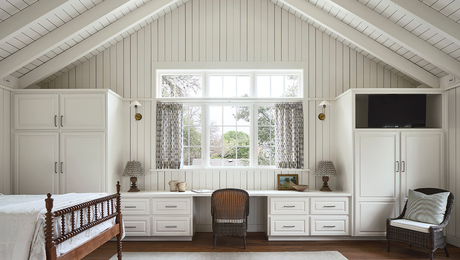Gonna be working on a house design that’s entirely off-grid. Owner’s intent is for a group of about 13 40-acre mini-ranches all off-grid. It’ll be among canyons somewhere beyond Pueblo, CO. Good solar and wind.
What products and techniques have y’all seen that would be most effective for off-grid living? Trying to separate the reality from the hype. Thanks.




















Replies
there was a thing down in DC where colleges built some house for energy efficency etc. one included solar panels and a hydrogen producer.
not much info about costs, but since students built it???
since you're involved I assume the budget is no object, so building 13 of these things might be possible.
wish I knew the name of the exhibetion. IIRC it was TOH that had the piece so maybe theire site.
bobl Volo, non valeo
Baloney detecter
>since you're involved I assume the budget is no objectSay WHAT?Budget is always an object. What I wouldn't give to have the budget of some of the projects I see posted here!!! Can't tell you how many calls I get where there's just $100k or $150k for construction and I'm asked what can be done for that.Thanks for the ref to the solar stuff in DC. Here's a link: http://www.eere.energy.gov/solar_decathlon/
Edited 3/22/2006 12:47 pm ET by CloudHidden
">since you're involved I assume the budget is no objectSay WHAT?"another bubble burst.http://www.eere.energy.gov/solar_decathlon/this is the expo i mentionedmaybe the gov site might help.so, what can you do for $100K?
bobl Volo, non valeo
Baloney detecter
solar batch water heaters are a good bet - I've seen several installs of different systems over the last 35 years - the only ones that give satisfaction are simple, self regulating systems - stay away from batteries if you possibly can -
here's an experienced authority -
http://www.realgoods.com/
and their spin off -
http://www.solarliving.org/
it's a lifestyle thing - not simple one for one replacements of standard systems -
hope this works out for you/them - I expect a full report if it gets off the ground -
Home Power magazine (and their website) is a real good source of good info on alternative energy technology (AE).
RealGoods company is a reputable AE technology supplier in Northern California. Their associated non-profit Solar Living Institute runs classes on all aspects of AE, I've attended a class on PV systems for electricians and it was worth the time and money.
The Institute also does consulting. For a project of the size you've mentioned, I'd either have an expert either do the system design(s), or at least review your proposed system design/specifications. I'm sure that Colorado has some good AE expertise, it's just that I'm in N. California and know of the folks at HP, RealGoods, and SLI.
My experience is that the AE market has matured (relative to even 10 years ago), and the companies that've been around for a while can be trusted to provide realistic info on the performance of their products. In fact, for a project as big as the one you're proposing, I'd bet that some of the major players would help you design a system if you commit to using their products.
One more bit of advice--developing a good design is essential, but only half the story. Installation is critical. Be sure to use an electrical contractor who has done AE systems before. It's easy to screw up the nuts and bolts of installation. I've seen general contractors who figured they could have one of their regular subcontractor electricians install a PV system. Even though it was a simple system, things went from bad to worse...a fried inverter--ouch!
Have fun with this--I've done a few PV systems, and it's pretty cool to commission an AE system. That's the fancy word for powering it up the first time--funny that an industry so full of old hippies and tree-huggers uses a word I associate with a military context.
Cliff
I figure you've already got the insulation and passive solar ideas down. Off grid living takes quite a few batteries, so I would devote a room to batteries and inverter and stuff, and since you don't know what kind of batteries those are going to be, it shouldn't share air with the rest of the house, especially a nice sealed up one. weatherheads for wiring coming from the roof might be nice, as well as J bolts tied into the rebar on the building, in places solar panels might end up.
The most time proven methods for off grid living involve very small houses and wood stoves.
Are these people going to use propane for supplemental heating, or wood, or?
From what I've seen of your houses, it doesn't seem like many changes are needed, aside from appliances and different electrical service drops.
zak
Keep in mind that the type of inverter you use can determine what will work. Sensitive electronics need a "pure" sine wave. Many inverters will produce a "square" or "Modified" sine wave. Our little computer controlled oil furnace needed a pure sine wave. When I used a regular generator with a modified wave I almost blew one of the motors.
Cloudhidden, Try looking at the NREL website. National Renewable Energy Lab. It is located in Golden, CO. They have lots of very good info and links to others. Sory I do not have the web site handy, Good luck. Please keep us posted.
All kinds of things can help
Thick adobe or rammed earth walls, or undergound/bermed/built into hills
heat sink built under the house
South faced orientation
Limit windows on the north and west and have more on the south
Eaves that are wide enough to shade the windows in the summer when the sun is high, but not too wide so that in the winter when the sun is low, the sun come in.
use the new solar cells that blend in with the shingles.
windmills for power if that is available
use passive solar water heating
If the area has the capability - geothermal for heating and power
If the area has a good year round stream , examine it for the possibility of a communal hydro power source.
The hardest part of living off the grid is not heat and cooling, it is the electricity.